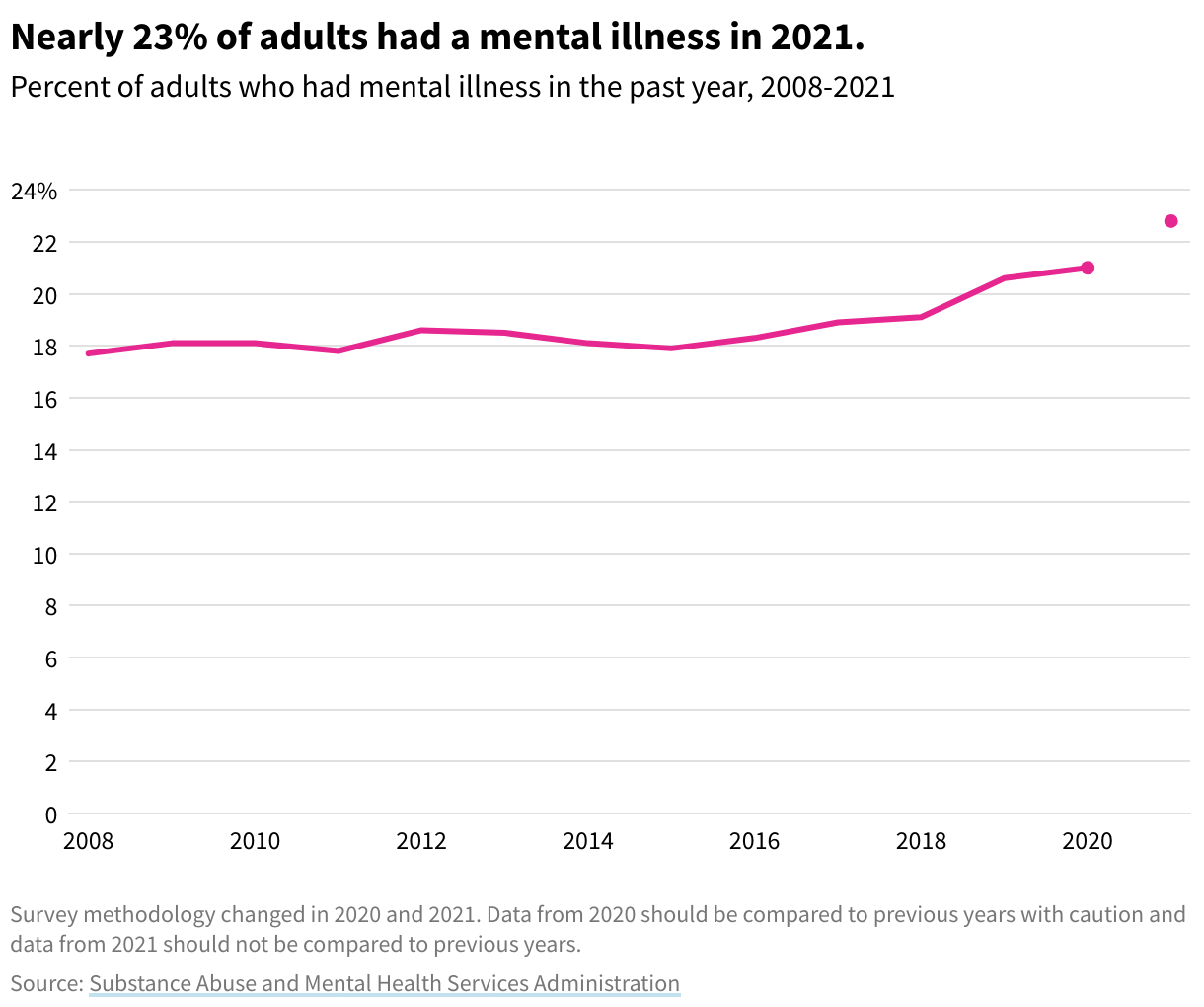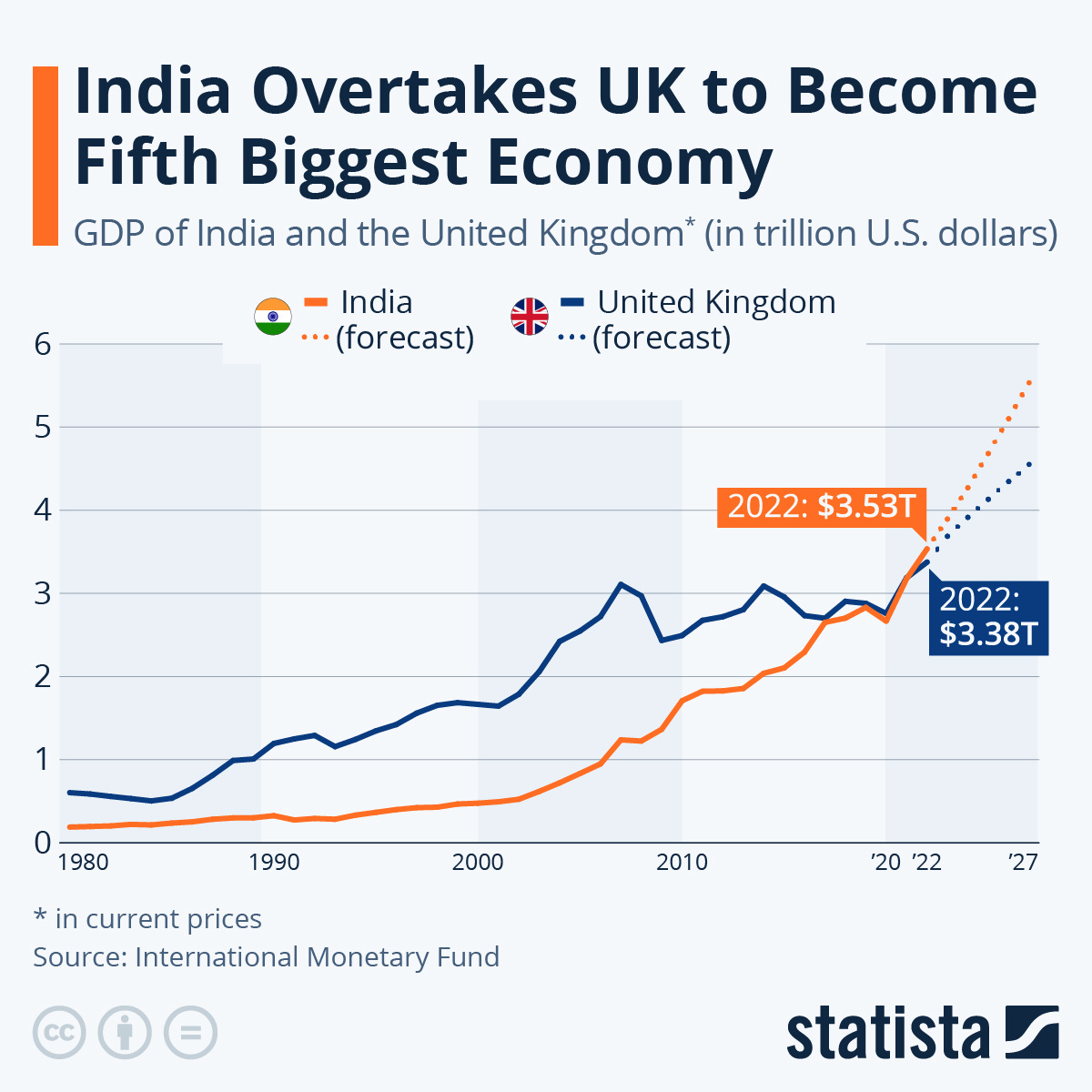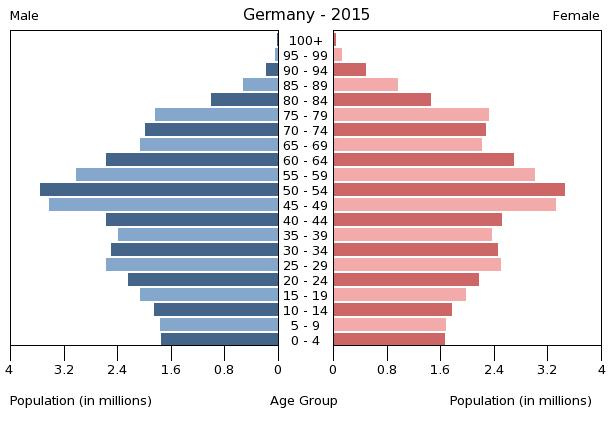A quick note before we begin,
I linked several other pages within this article. Any page that I linked on here is one that I respect, even if I am disagreeing with their stance within this work. Please check all of them out, they’re very good accounts. If I linked a specific article, I highly recommend reading it in order to better understand this piece itself, as I draw heavily from some of them. Thank you.
The Problem
The United States and the rest of the Western nations have a problem with the quality of their human capital: it’s been steadily decreasing over the past century or two. There’s the obvious side of this, the stuff you can see like obesity or the homeless crisis, but there are also more subtle aspects. For starters, IQ has been dropping over the past few decades. Mental disorders have been on the rise, and general mental health has been on the decline.
Simultaneously, our politics have become less and less coherent over the years. The nature of these shared trajectories is not coincidental. Lower quality people lead to lower quality citizens… lower quality citizens lead to political circus… political circus appeases unintelligent or uninvested masses… the cycle continues.
As I will elaborate on below, this is the very first political issue; everything else stems from the following: who you have and who you want to influence things. If these two issues are “resolved”, everything else can be made to function. If not, no matter what efforts are undertaken, they will fail.
Human Capital and Nature
Any political conversation which is not rooted in or concerned with the available human capital is fantasy. You can’t accomplish any political goal without quality people to hunker down and get it done. No organization will run with dysfunctional staffing, an army can’t march rapidly with unfit soldiers, NASA can’t pull off a moon-landing without rocket scientists, etc. etc. On the larger scale, any desired government agenda can’t be accomplished without the right people for the job. I don’t just mean “the Experts”, (particularly not in a world in which a degree means virtually null), I mean the actual staff doing the legwork have to be quality people, both intelligent and diligent. This is particularly true when we’re talking about starting entirely new initiatives or replacing bad ones from scratch.
For this reason alone, (not to mention the impact human capital has economically), a smart government would concern itself with increasing the human capital it has at its disposal. This is why the word “regime” refers to governments as well as a training plan: historically government has often acted as a sort of training plan for a society. Education, rites of passage, citizenship and even proto-eugenics served for this purpose. Almost all of Plato’s Republic is dedicated to the subjects of education and eugenics.
On the other side of the issue, not investing in human capital leads to negative consequences. Crime, for example, is a result of low-time preference behavior, when it is not an intelligence question outright. Not robbing your local Chevron is much more likely to reward you in the long-term, particularly with the high rate of solved robberies in the United States and likelihood of encountering surveillance equipment, yet some would still rather take the risk for a short term profit. Obviously this can be partially solved with the introduction of
’s “lamplighters” and Bukele-style law-enforcement, but just how many lamplighters can we create, and how much room do we have in our prisons? Should we look a little deeper into the future?With both negative consequences for low human capital as well as positive benefits for high human capital, it seems like an obvious choice for government to invest in increasing the human capital at its disposal. Yet governments across the West are doing the exact opposite. Obviously we must discuss immigration here: importing millions of low-skill workers from third world countries does nothing to improve the population’s skill base. Sure, it will temporarily increase the GDP, but in the long run you’re turning your country into a labor-state when it previously employed most of the labor in others. India has a relatively high GDP, I don’t want to live in India.
Oftentimes the justification for these immigration policies, (when it isn’t moralistic in nature), is that the native population is decreasing. This is the case in most Western nations. However, throughout human history populations have fluctuated. (Also view this). Only obsession over constant growth through sheer numbers would lead even a mid-wit to believe that mass-scale migration is necessary to resolve this issue.
No, the real reason for mass migration is a rejection of belief in the idea of different levels of ability at all; specifically the impact of nature on ability. To the globalist, swapping a billion Guatemalans for five million Norwegians is an upgrade because a billion is more than five million. To a Mexican, (the only people who dislike the company of Guatemalans more than me), this is absurd. “Mexican day laborers just work harder than Guatemalans on average”, one may say, “they consume fewer Modelo-per-hour”, (a good labor measurement rate), “and they break less equipment.” Simply having more of them at the jobsite doesn’t mean more work will get done. In a similar vein, having several thousand Mexicans crossing the border a day is not the same as having a positive birth rate among the WASP population domestically.
This isn’t a conversation about race or even nationality, it just simplifies the issue to frame it in terms of population averages. When we move to domestic policy this gets a little bit more complicated, it’s not as though I can make a claim about a specific state’s population’s average value per capita, and even if I could what would I do with that information; advocate removing a state? No, I’m not attempting to play the game of which population groups we want to have or not have in totality here. However, there are other policies to consider.
The United States government already provides tax reductions for new parents, as well as some minor maternity employment rights. However, on this policy as well we fall into the fallacy of treating all people as equally capable. Arguably, we would want to increase the birth rates of our most successful people, rather than our least. After all, we’re currently trending towards Idiocracy at a rapid pace. Mind you, this isn’t me saying we should be trying to prevent our lower classes from having kids, the fact that a lower middle class family requires two incomes in order to barely afford children is absurd, but designing a financial policy which encourages the lower classes to have more children than the middle is arguably worse, at least when it comes to increasing our potential.
The cult of antiracism definitely has its mark. Policies intentionally designed to benefit minorities over whites, whether in terms of birthrates or FEMA responses. Obviously, as I have mentioned before on this account,
has some excellent points regarding anti-white racism in the U.S., (discussed further here), but to go into detail would be a bit tangential as I’m more concerned with the effects of obsession over anti-racism on policy here. One notable detail however is that perhaps our concern over equity with regard to race has contributed to some of our issues.When liberals hear “lower classes”, they think “minority rights”. When they hear “lower middle class”, they think “black people”. When they hear “middle class”, they think of rich white people. Therefore, to try and discuss any sort of fiscal policy which isn’t designed to increase lower to lower middle class birthrates, it must be racial in nature, (this assumption itself could be considered racist by some, but I won’t go down that road). The same lens is applied to wedlock. While it is well known social science that children born in wedlock are significantly more likely to be successful, no policy is pursed to directly encourage this, but I’ll return to this more in the section on nurture. Because of the way in which we frame arguments as racial, we aren’t allowed to consider a non-equitable plan regarding birth rates.
I don’t want to curb black birth rates, nor increase white birth rates. I wouldn’t advocate a fiscal policy designed around racial birth rates at all. However, as any environmental science professor will gleefully tell you, the higher your education in this country, the less likely you are to have children, and all Western nations have an vase-shaped population pyramid.
Does this not sound familiar? I want a government which realizes the impact that nature has on ability, and acts accordingly. This brings me to the next topic, education and child-rearing.
Human Capital and Nurture
While, nature plays a large role in the overall ability of a human being, how one is raised and educated also has quite a say. Therefore, one would imagine that any government would dedicate a great deal of effort to ensuring that children had consistent access to one or both parents and a good education.
LOL… LMAO even…
In fact, the opposite is true. The United States government puts virtually no effort into allowing children time with their biological mother, let alone father. Instead, the assumed policy is putting a child with either a babysitter or in a daycare the instant an opportunity is provided. It is viewed as much more important to put both parents back into the work force as quickly as possible. And understandably so! If you don’t run the household off of two incomes, how are you supposed to afford to own your house, or even keep rent paid? Inflation has obviously taken its toll. Yet, the U.S. government would rather incentivize you to use overpriced child-care centers, (including after your child has already gotten off of school), than help you provide for one parent to stay home. Not to mention the culture surrounding such behavior, as
recently touched upon in this article.This is why I get somewhat frustrated with conversations about fertility in the West. While there is a large anti-natalist segment within our culture, a lot of those who want children can afford to, but would rather wait until they can provide for them better, or until they are sure of a good marriage. You’ll never be able to argue that effect away, it’s been the case in the West for millennia that we invest more in our children than other cultures do. However, with concerns over affordability a lot of people may end up being outrun by the clock, as
correctly points out here, but I think we sometimes forget how bad the situation is with family finance in this country. I’ll speak personally to this, I want to have children within the next five years, however, I also want to ensure that my wife will be able to stay at home with the children, or at least on the occasions that she isn’t, I will. I also want to ensure that my children don’t have to endure a divorce, which is something American men must think carefully on unfortunately. These concerns can be somewhat negated if you live in a good community of people, but those are harder and harder to come by. The types are right with regard to the individualistic of anti-natalism in our culture, but they somewhat miss the mark. Not having children at 19 isn’t always just a selfish decision, (obviously being a tad hyperbolic), sometimes it’s for the benefit of the children in question.
To get back to the main subject of this essay, the government at minimum needs to focus on making family life affordable. There is obviously a point here about women in the workforce, but I’ll leave it alone for the moment. Many would argue this should be done primarily via subsidy, but I disagree. I believe instead that family planning should receive priority over employment in all economic thought, and inflation should be given serious consideration, not just as a debate topic, but a real priority. I know, suuuper original idea, but it really does come down largely to very simple common-sense fiscal policy decisions which have been set aside in favor of GDP prioritization.
Another subject is monogamy. As I was editing this essay,
posted this piece about the impact of Christianity, (more specifically monogamy), on cognitive ability in the West. Data like this has been somewhat available for a long time, but recently it’s become a clear correlation between births in monogamous marriages and increased cognition. Even putting the nature of it to the side, we’ve known for basically forever that having children out of wedlock places them at a disadvantage. Of course, a shitlib would argue that this is because of “like… prejudice and discrimination man”, but obviously the simple explanation is that a child born out of wedlock likely only has one parent available. So, I’ll just skip to the question, why are we subsidizing having children out of wedlock? Even -type pseudo libertarians could correctly point out that what you subsidize, you actually encourage. So why are we not prioritizing healthy young families receiving subsidies? In fact, in lower income households, it makes more financial sense with regards to welfare to avoid marriage and claim single-motherhood than it does to marry. Putting funding towards this is detrimental to everyone involved— parents, children and taxpayer alike, not to mention the effect on our population over generations.And what of health? The multitude of pollutants in our environment as well as low quality food have definitely taken their toll. I would be amiss not to mention the work of
on this subject, (here is a good place to start with that). Everyone who takes their health seriously needs to read a few of his essays. The United States has a childhood obesity rate which has steadily remained above 20% for the past decade, and is second to only the UK in children who’s diets are majority ultra-processed. Not only do both obesity and consumption of ultra-processed foods have horrific effects on your health and reproduction, they also are linked to declined cognition. The fluoride in the water has now been linked directly to drops in IQ as well as the rise of Alzheimer’s disease, as some of us have know for years.What kind of government allows its citizens to be exposed to this kind of nonsense? I would imagine only the kind which doesn’t care about them at all, which is where we must be finding ourselves. It’s just unthinkable that we were sold a lie about fluoride being necessary for our dental health, or that we have the least regulations on food dyes in CHILDREN’S CEREAL of any developed nation. Yet here we are.
But perhaps the current regime doesn’t actually want to increase its human capital through either nature or nurture. Perhaps it finds it much easier to subdue a population which is distracted and unintelligent. Or, more likely, our lack of emphasis on human capital has actually given us a government which is so incompetent that it appears malicious, although there are definitely elements of both. This leads me to my final subject, citizenship.
Citizenship
Citizenship is a uniquely Western institution. It was never historically synonymous with mere residency until the 20th century; it referred to a specific status within a polity. A citizen in various places and points in history may not have had some of the political say that we think of now, such as voting rights, but he would be entitled to some level of protection under the law. Of course, many polities did have some sort of political representation in history, ancient Athens being a well-known example. However, Rome had the class of “Civitas sine suffragio”, or “Citizen without the vote”. This entitled people living in conquered lands to the same legal protections as Roman citizens, but prevented them from voting in popular assemblies.
In the Greek city states, citizens were required to have served been trained for military service and have spent time at least eligible for a call to arms. More specifically, in Athens they were required to have undergone a two year training regime, (with some actual service), consisting of military training as well as poetry and philosophy. During this time, many of their rights were removed and they were separated from their families for long periods. After completion of this training, they were issued a spear and shield from the state. Only around 10-20% of the population of Athens were citizens at any given time.
It is worth noting that the idea of a universal vote would have been seen as absurd, (if even considered at all), by even the most “democratic” of Greek philosophers. The obvious political consequences are just far too undesirable. But even more drastic, the idea of citizen’s rights by birthright would have been seen as just as insane. Once-more using Athens as the example, Citizenship-through-birth was practiced, meaning that one had to have an Athenian father, (and sometimes mother), to be eligible. Now, Athenian residents had protections under the law as well, of course, but these were not the same as citizens. There was also a class of non-Athenian residents, who had very little legal protections.
On the subject of citizenship,
wrote an excellent piece regarding the connection between citizenship and organized violence as I was writing this, which negated a significant amount of this section. Please take the time to read this as well, as I found the first section particularly relevant on the subject at hand. To briefly summarize: citizenship has always revolved around both satiating and allowing the class most capable of organized violence to participate in politics. Even in exceptions to this rule, it was historically given only to those with large stakes in the overall functionality of society.Now, let’s contrast this with our modern American citizenship. First of all, citizenship is considered to be both universal and birthright, meaning that regardless of heritage, anyone born on American soil is American. Second, the idea of limiting the right to vote by requiring military service, or really any requirement is seen as blatant fascist rhetoric. Citizenship rights also may as well extend to parents of citizens thanks to the “dreamer” status, but that’s somewhat of a tangent. The point is, the institution of citizenship has been greatly democratized in Western society, particularly the U.S.
In my opinion, this not only degrades the status of American citizen, but also places many of the rights which I hold to be of great importance in question. For example, the Second Amendment. I am in complete agreement that a great many people living in this country are barely capable of driving an automobile, so when a liberal attacks the idea of firearm ownership for all, I can understand the point. However, I have no interest in ever turning in or losing mine. I don’t see this as hypocritical, I just understand that some people really do have no business with a gun. The Second Amendment is also of great importance to me, as I find myself living under a government which hates me with various criminal subpopulations on the rise. I strongly believe that all citizens should be able to own firearms, and not in some artificially limited capacity either. Note the italics.
In the same vein, the number of naturalized “citizens” who will vote in this election, (obviously for the party which supported their immigration and naturalization), is terrifying. This is aside from the number of non-naturalized who will likely vote, that is also a different subject. But the fact that illegally crossing our border before giving birth is a strategy to even make the child a citizen, (let alone to help the parents prevent deportation), is clear evidence of the insanity of our current immigration policy.
This is also worth discussing without using the example of immigration. Are all Americans born equal? Should everyone born in the U.S., heritage American or not, be granted the same protections and political influence? If not, how should we decide this? Should we revert to the ancestral remedy, required military service? I lean towards that some in order to prevent the “Revenge of the Nerd”, that we’re seeing now, as
speaks on here. That would be a great improvement in some ways, sure. Perhaps we institute a sort of liftocratic-representation: vote proportional to deadlift. I’m sure some spergs thinks a raw IQ test is a good system. I’ll get serious again soon, don’t worry.Naturalization laws in the United States have varied throughout history. The first law allowing for immigrant naturalization, (The Naturalization law of 1790), required two years of residency. This was soon changed to fifteen. Today the law sits at a minimum of two and a half years, one and a half if you are married to a citizen. In theory, one must be able to speak and read basic English, understand US civics and “be of good moral character”. Now, considering many born Americans can’t do this, I have my doubts that immigrants are really being held to any of these standards. In fact I know that they aren’t, both from knowing immigrants and former USCIS workers.
The effects of the democratization of citizenship are obvious. Firstly, every election has become a complete circus. The advertisements are intentional distortions of the opposing side, the debates are mostly a long series of insults, claiming an opponent is fascists or anti-democracy is commonplace, etc etc. The Harris campaign runs political ads in Spanish, (which would be unnecessary if immigration requirements were followed). The standard for who can vote is pathetic. In a related note, a state court in Texas has declared that illegal aliens have the same right to a firearm as citizens, making the following points on citizens’ rights null, but I’ll make them anyways.
One of the reasons why crime is so high in vast urban areas of the U.S. is because of the difficulty in prosecuting criminals, and the limits on sentencing, particularly with prison crowing. I find the entire debate ridiculous. Many of these areas have blocks in which police simply stop enforcing the law, meaning truancy isn’t exactly applicable. This means that many of the legally born citizens in these areas have little to no education, and are essentially employed in a quasi-criminal fashion immediately. Yet when police do enforce laws in these areas, the subject of government overreach or racial politics is somehow more relevant than a criminal monopoly of violence.
Obviously in using places like Jackson, Chicago, Baltimore and Detroit as examples I am being extreme. But the same sorts of criminal underground behavior are becoming standard across U.S. cities. Look at the recent example of Aurora Colorado, (You can use the “tools” option in Google Chrome to search for results before the mass media coverup). Now, I don’t advocate completely draconian measures, (I will probably speak on crime more generally at some point), but I do not believe in the idiom of “I would rather ten guilty men go free than one innocent man hang”. Frankly, this argument only works if you somehow believe that violence committed by a government is more morally reprehensible than violence committed by an individual, which is idiotic.
No, these people cannot be allowed to have the same legal protections as law abiding citizens. In fact, they shouldn’t even be called citizens. There is an easy term for this—resident. These people may live in this country, but many are not capable of the responsibilities of citizens, thus they should not receive the same protections. It’s worth noting here that by “these people”, I do not mean “non-whites”, (there are plenty of whites to whom the same statements apply and plenty of non-whites for whom they do not), what I mean is simply people who spend their entire lives in a quasi-criminal fashion. There has to be some sort of limit on who is a citizen in any stable nation. Those who are not cannot be afforded the same protections at the expense of the safety of both residents and citizens.
On the Relationship Between Citizenry and Human Capital
The issues of human capital and citizenship are directly linked. Normally, the downfall of one leads to the downfall of the other: bad citizens lead to bad politics, bad politics leads to bad education, child rearing and even partner selection, which in turn lowers the human capital of the nation. Low human capital leads to bad citizenry, the cycle continues. The good news is that the cycle can be made to go the other direction. Good human capital makes good citizens, good citizens can help governments make/enforce good policy, etc. This is the classic sort of “conservative” plan; that we just have to educate the people on good policy and they’ll just vote in good politicians and things will heal. The problem is it’s wrong and won’t work.
We have passed the point of educating the citizenry into good policy, it was too democratized in the U.S. to begin with, and the quality of citizen has degraded steadily over the years. There is no world in which you can convince the American people en masse to simply vote in a politician who intends to well and truly correct our problems. A great example of this is in the current election cycle: the Harris campaign directly refers to Trump’s tariff plan, (of a sort which we desperately need), as a “national sales tax” which would cost families money. It is true that the short term effects of tariffs are initially pushed onto the taxpayer, but when compared to the costs of outsourced manufacturing both on the nation and the economy over the long term, this is null. However, to the average voter this is not a thought, if they’re even aware that the “national sales tax” is, in fact, a tariff at all.
The current election if of itself is evidence of our fall. Trump may be the best candidate in recent years, but I find it unfortunate in some ways that our options are Kamala Harris, (need I say more), and a reality TV star, particularly one who lacks truly hardline standpoints on most issues, including the ones that desperately need one such as immigration and military reform.
No, instead we are only presented with two ways forward. The first is the
strategy, which I have discussed briefly here. This has its appeal of course, Democracy has always been a deeply flawed system. I remain open to the idea of monarchy, however I raise some objection with the idea that allowing continued Kamalite regimes will put us anywhere near this. According to Yarvin himself, the Russian Revolution was a wave of democratic force, but that also got them Stalin, and Stalin is the last thing I want.The alternative to an American palace coup or Caesar is a simple restriction of the citizenry, but this leaves us with the obvious issue of the next regime can simply walk it back. However, if it were to be accomplished perhaps restrictions could go further than our founders initially intended, (I think if Washington could see us now he’d accept these terms), with the hopes of preventing us reaching here.
Personally, I lean towards a version of the first option, but with the institution of citizenship preserved, (perhaps local voting only, or regional decision). The reason for this is simple: contrary to the predictions laid out in the original Unqualified Reservations blog, warfare has not recentralized and the age of the revolution has not ended, (albeit revolutions currently lie psyop’d and stunned). In fact, I find it unlikely that this trend will ever reverse, considering it has been on the same trajectory towards decentralization for the entirety of the history of organized warfare. Because of this, those most capable of organized violence must remain satiated. Despite these issued, I don’t think a restriction of the citizenry alone is achievable nor sustainable. For now I’ll leave my idealized system out of it, although I do intend to return to the issue soon in another essay.
To summarize, human capital and citizenship are in an endless cycle of decline at the moment. This has been the same trend since the founding of the United States, and the same disease has spread throughout the West. There is no way forward for our country or even civilization without increasing the quality of our human capital, and the lowest quality people will never vote in policies designed to curb their influence. We must look elsewhere for solutions.










